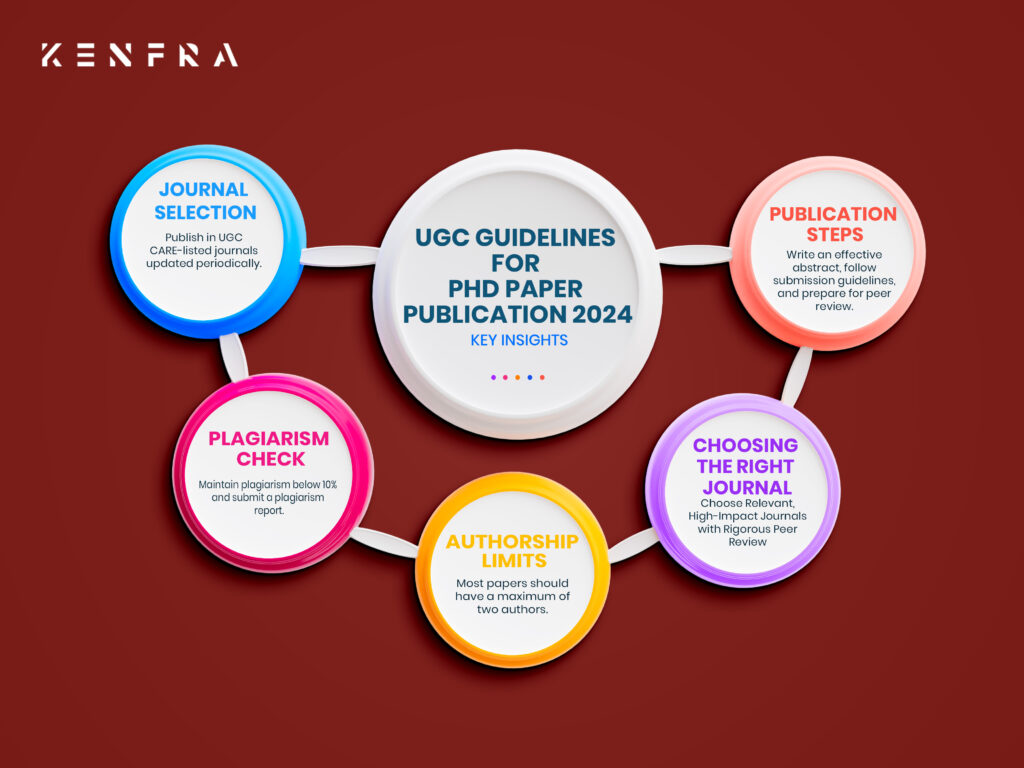UGC Guidelines for PhD Paper Publication 2024.
Kenfra2024-09-20T14:09:12+05:30Navigating UGC Guidelines for PhD Paper Publication in 2024
Publishing a PhD paper under UGC guidelines is a crucial step for academic recognition. The updated UGC guidelines for 2024 bring important changes. Let’s dive into the key aspects of these regulations and how PhD candidates can ensure successful publication.
Understanding UGC’s Role in PhD Paper Publication
The University Grants Commission (UGC) sets benchmarks for quality and standardization in higher education across India. For PhD candidates, publishing in UGC-approved journals is mandatory for the award of degrees. The UGC provides a list of approved journals that meet its rigorous standards, ensuring that research work is credible, relevant, and impactful.
Key Changes in UGC Guidelines for 2024
The UGC regularly updates its guidelines to reflect current academic standards. Here are the latest updates for 2024:
- Journal Selection: PhD candidates must publish their research papers in UGC CARE-listed journals. This list is updated periodically, so candidates should ensure they are targeting currently listed journals.
- Plagiarism Check: The UGC guidelines continue to emphasize the importance of originality. Plagiarism must be below 10% to qualify for publication, and candidates are required to submit a plagiarism report.
- Multiple Authorship Limitations: The number of authors per paper has been limited. A maximum of two authors is allowed for most disciplines, except for collaborative research.
Choosing the Right Journal for Your PhD Paper
Publishing in the right UGC-approved journal is essential for academic recognition. Here are some tips for selecting the right journal:
- Research Scope: Ensure the journal aligns with your research domain. Journals that are too broad or unrelated may not give your PhD paper the right exposure.
- Impact Factor: Opt for journals with a higher impact factor as they offer greater visibility and academic respect.
- Peer Review Process: Always check if the journal has a rigorous peer-review process. This ensures that your PhD research paper is refined before publication.
Steps to Ensure Successful PhD Paper Publication in 2024
To increase the chances of your PhD paper being published, follow these steps:
- Write an Effective Abstract: Your abstract is the first thing editors will see. Make it concise, engaging, and informative, summarizing your key research findings.
- Follow Submission Guidelines: Journals often have specific formatting and submission requirements. Sticking to these guidelines shows professionalism and prevents delays in publication.
- Prepare for Peer Review: After submission, your paper will go through a peer-review process. Be ready to make revisions based on reviewer feedback.
Common Challenges in PhD Paper Publication
Publishing a PhD paper isn’t without challenges. Here are some common issues faced by scholars:
- Rejections: Many PhD research papers face rejection due to poor alignment with journal guidelines, lack of novelty, or issues with plagiarism.
- Long Review Periods: The peer-review process can be lengthy. Scholars need to be patient and follow up on their submission status.
- Formatting Errors: Small errors like incorrect citations or formatting issues can result in delays. Ensure your PhD paper meets all UGC-approved journal technical requirements.
Why UGC Guidelines Matter for PhD Publication
The UGC guidelines ensure that PhD publications are of high quality, contributing to the academic community. For PhD scholars, following these guidelines not only ensures compliance but also improves the chances of their research gaining visibility and credibility.
Conclusion: Navigating UGC Guidelines for PhD Paper Publication in 2024
PhD candidates must proactively understand and adhere to the UGC guidelines for PhD paper publication. By selecting the right journal, maintaining originality, and following submission protocols, you can significantly improve your chances of successful publication in 2024.
By taking these steps, scholars can navigate the complexities of PhD paper publication while meeting UGC’s guidelines.












Leave a Reply